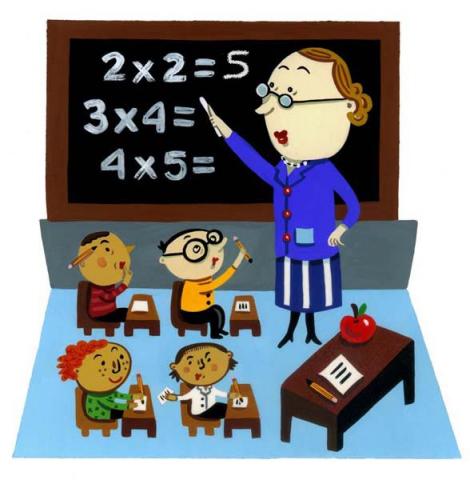(Mis)educating our nation’s youth

Have you ever wondered why complex political-economic ideologies and policies, such as neo-liberalism, which present gross economic and social and inequalities as inevitable, necessary or even desirable can be so palatable to so many, such that those on the left are so readily cast and perceived as ‘loonies’? The following nuggets of wisdom, which ‘explain’ global inequalities, ‘underdevelopment’ and poverty, are taken from second-level textbooks currently being used in an Irish context. Collectively, they offer some clues as to why the ‘there is no alternative thesis’ remains such an enduringly popular myth. These excerpts are taken from a much larger research study which my colleague, Meliosa Bracken and I have conducted, which looks at the ways in which international development and citizenship related themes and topics are addressed in post-primary schools. With these ideas being presented as authoritative and legitimate forms of knowledge, the ‘loony left’s’ myth-busting work is cut out for it. Lest you think these snippets are unrepresentative of the broader curriculum, we analysed over 60 textbooks across six academic subjects, and found a number of dominant themes and storylines.
Here’s what Leaving Certificate Economics textbooks, for example, have to say about global inequalities and so-called ‘underdevelopment’:
Even if the resources in the world were more evenly distributed, there would not be enough goods available to feed, clothe and house the more than 6,000 million people in the world. The supply of goods in the world is limited and scarce (Modern Economics, 2004).
The perpetual dissatisfaction with the material wealth which we possess and our desire to accumulate more is an essential characteristic of human nature (Modern Economics, 2004).
The first and most essential requirement for any country to achieve economic development is to create this desire among its citizens. This may arise from a demonstration effect from other countries or from political leadership. In particular, it may require a change in cultural, religious and social practices (Understanding Economics, 2008).
Subtext: The conditions which fuel exploitation and oppression are an inevitable feature of human nature, rather than a feature of specific types of political-economic systems and societies based on consumer capitalism. Therefore nothing can be done to reverse the ideologies and practices that are so intimately tied to human suffering, because that’s ‘just the way it is.’ There is absolutely no action that can be taken that would actually alter the current system so that more equitable systems might exist. World poverty and hunger are a inevitable due to a global ‘scarcity of goods.’ Meanwhile, ‘underdeveloped countries’ (whose inhabitants, incidentally, are ignorant and lazy and don’t appreciate or value ‘our ways’) should adopt Western cultural values and social practices which are much more conducive to economic development.
And here’s what Leaving Certificate Home Economics textbooks have to say about why some people are poor:
Children from lower socio-economic families do not get the same opportunities, and place less importance on education than children of the better off in society. They end up unemployed or in low paid jobs and have their own children who are born into the perpetual cycle of poverty (Lifelines, 2005).
Children brought up in poverty are more likely to repeat the cycle [of poverty]. The attitudes and the behaviour of poor people keeps them in the poverty cycle for longer and often into the next generation (Living Life, 2007).
Subtext: Poverty and underdevelopment are the result of cultural and family inadequacies rather than economic problems of structural inequality. Poorer families don’t give a damn about education and they deserve what they get.
And here’s how one Junior Certificate Geography textbook portrays Northern and Southern Governments and their peoples:
The North is said to be developed and rich, whereas the South is said to be developing and poor. In the North, the government tends to play a central role in the welfare of its citizens. In the South, the government may not be actively concerned with the country’s development. It is sometimes said that they are more interested in holding onto power than in the citizens and their needs (Earth Matters, 2008).
Subtext: Northern governments are benevolent entities who prioritise the wellbeing of their citizens in stark contrast to their Southern counterparts who are selfish and preoccupied with power (ahem!).
Meanwhile, one of the subject areas that addresses issues of inequality and development most explicitly, Civic, Social and Political Education (CSPE), is widely perceived as a ‘Cinderella subject’ in schools because of the failure to grant it parity of esteem with other academic subjects. CSPE teachers, many of whom are ‘conscripted’ to teach the subject and who often have no formal training in it, are expected to squeeze complex issues like poverty, justice, inequality, sustainably and development, rights and responsibilities, into one forty-minute lesson once a week (up to Junior Certificate level only). Moreover, what we call ‘obedient activism’ is a dominant feature of the CSPE syllabus (telling young people to engage in low-cost, individualistic forms of activism like fundraising), which closes off opportunities for young people to think creatively and independently about how they might be part of resolving complex social problems.
It’s time to re-write the curriculum, for a whole host of reasons, not least of which because most of it all just sounds so laughable in light of recent events. And perhaps the next time some high profile media commentator wheels out that old chestnut about the vital importance of education in getting us out of this mess, or reverts to a patronising discourse about young people as our ‘hope for the future,’ they should reflect a little bit more on the mis-education that is our current education system which is so deeply implicated in the apathy and despondency that so many young people in Ireland are currently experiencing.
